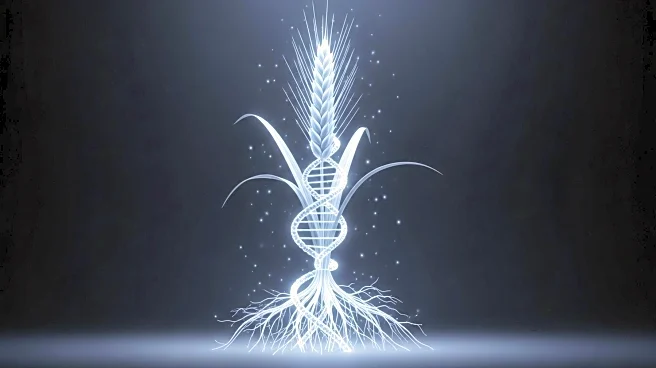What is the story about?
What's Happening?
Researchers at the University of California, Davis have successfully used CRISPR technology to develop wheat plants capable of producing their own fertilizer. This breakthrough involves the wheat plants releasing a chemical that aids soil bacteria in converting atmospheric nitrogen into a form usable by plants, a process known as nitrogen fixation. Wheat accounts for approximately 18% of global nitrogen fertilizer usage, with only 30% to 50% of the nitrogen being absorbed by plants. The excess nitrogen can lead to environmental issues such as 'dead zones' in waterways and the production of nitrous oxide, a greenhouse gas. The research, led by Eduardo Blumwald, PhD, aims to reduce fertilizer usage, potentially saving billions of dollars annually and benefiting regions like Africa where fertilizer use is limited due to cost.
Why It's Important?
The development of self-fertilizing wheat through CRISPR technology could significantly impact agricultural practices and environmental sustainability. By reducing the need for synthetic fertilizers, this innovation may lower agricultural costs and decrease environmental pollution, particularly nitrogen runoff that contributes to aquatic 'dead zones' and greenhouse gas emissions. This advancement could be especially beneficial for developing countries with limited access to fertilizers, enhancing food security and promoting sustainable farming practices. The potential economic savings and environmental benefits underscore the importance of this research in addressing global agricultural challenges.
What's Next?
The next steps involve further research and potential commercialization of this gene-edited wheat. If successful, this technology could be applied to other cereal crops, expanding its impact on global agriculture. Regulatory approval and public acceptance of gene-edited crops will be crucial for widespread adoption. Stakeholders, including policymakers, environmental groups, and agricultural businesses, will likely engage in discussions about the implications and ethical considerations of using CRISPR technology in food production.
Beyond the Headlines
This development raises ethical and regulatory questions about the use of gene-editing technologies in agriculture. While CRISPR is distinct from genetic modification, public perception and regulatory frameworks will play a significant role in its acceptance. The long-term effects on biodiversity and ecosystem health are also considerations that researchers and policymakers must address.















